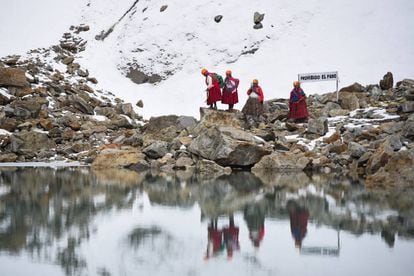Extreme temperatures cause thousands of deaths each year in Latin America.
The very cold ones, and also the very hot ones.
This is stated in the study
Impact at the city level of extreme temperatures and mortality in Latin America
,
recently published in the journal
Nature
.
In the midst of a global debate about the scope of climate change, a group of scientists has studied the correlation between extreme cold and heat and deaths in 326 cities in nine countries in the region.
In these sites, they managed to link at least 887,313 deaths to extreme weather over 14 years of study.
The human body regulates exposure to extreme temperatures through thermoregulation.
When exposed to heat, it responds with vasodilation, in which heat moves from the muscles to the skin, which removes it through sweat.
In an episode of exposure to cold, on the contrary, vasoconstriction and thermogenesis are activated.
Both processes require a greater physical demand on the body.
"Under conditions of extreme heat stress, these thermoregulatory processes can lead to increased cardiac demand, dehydration, and pulmonary stress," the article explains.
Meanwhile, “exceeding thermoregulatory capacity in extremely cold conditions can lead to decreased cardiac output, hypotension, and ultimately organ failure,” he adds.
In this way, climates that are not optimal for the body have been linked to "a variety of cardiovascular and respiratory causes of death," the publication details.
The incidence that extreme temperatures have had on health had already begun to be measured in many parts of the world, mainly in high-income countries, such as the United States or the members of the European Union.
But until now, this factor had not been studied in depth in Latin America, one of the most urbanized regions in the world.
Josiah Kephart, a researcher at the Drexel University School of Public Health and co-author of the study, explains that they collected death data from these cities over several years and disaggregated it by day, cause of death, sex and age.
They combined those numbers with daily information on temperatures at each site.
"We looked at associations between temperature and risk of death, and found that more than 5% of all deaths can be attributed to or explained by temperatures that are hotter or colder than optimal."
Of a total of 15.4 million deaths registered between 2002 and 2015, at least 887,313 deaths were related to the weather.
The mountain guides of the group of climbers Cholita, defenders of the Charquini glacier, in Bolivia, fight for the preservation of this site before the wave of tourists who visit it year after year. Claudia Morales (REUTERS)
The study indicates that the largest fraction of excess death was due to cold, which was around 5.09%, this translates into about 785,000 deaths.
While the minority was due to heat, 0.67%, some 102,000 deaths.
However, a change of one degree Celsius in cold temperatures does not have the same impact as one more degree in extreme heat.
"At temperatures below the optimum temperature, mortality increased gradually as temperatures fell, while at temperatures above the optimum, mortality increased more steeply as temperatures increased," the paper explains.
This is aggravated when analyzed in a global scenario of climate change.
In the coming decades, Latin America is projected to experience a substantial increase in annual mean temperature and, critically, a staggering increase in the frequency of extreme heat events.
Global warming has been recorded in recent decades in the average temperature records of cities.
Only in Mexico, the national average increased two degrees in the last 35 years, with a very pronounced curve from 2005, according to data from the National Institute of Ecology and Climate Change (INECC).
According to academics, the frequency of extremely hot days in the large cities of South America is expected to increase in the future between five and 10 times faster than the global average level.
By the end of the 21st century, overwhelming heat-related mortality would cause a substantial net increase in excess temperature-related mortality.
Regarding the causes of death, temperature mainly affected those with cardiovascular or respiratory diseases.
As it also did with those over 65 years of age, a fact that is worrying for researchers, given that the figures report a sudden aging of the population in Latin America.
"Finding such a large impact of extreme temperatures on mortality is really important and alarming if you think about the future, the factors of climate change and population aging, coming together in this highly urbanized area," says Kephart.
Massive urbanization represents another aggravating factor, says the study, because it contributes to an increase in the exposure of citizens to extreme heat.
“Latin America is one of the most urbanized regions in the world and therefore has a large population at risk of exposure to urban heat.”
In particular through the urban heat island effect: “Ambient temperatures in urban cores, where residents are concentrated, can far exceed temperatures in peri-urban areas, making urban residents especially exposed to extreme heat ”.
These data should be used to draw future policies, says Kephart.
For that it is necessary to disaggregate them by cities.
A city in the Andes mountain range is not the same as in the Caribbean.
"Increases in mortality risk from a 1°C increase in extreme heat are particularly pronounced in cities on the coast of Mexico, northern Argentina, and southern Brazil," she details.
Future adaptation has to be planned differently in each place.
"A greater understanding of the factors in cities," the article concludes, "may help identify effective actions to buffer future impacts of climate change."
You can follow
MATERIA
on
,
and
, or sign up here to receive
our weekly newsletter
.
50% off
Exclusive content for subscribers
read without limits
subscribe
I'm already a subscriber



/cloudfront-eu-central-1.images.arcpublishing.com/prisa/NYBERFPPHVEJVER4FIRIEAGGX4.jpg)


/cloudfront-eu-central-1.images.arcpublishing.com/prisa/ZU5KUJFBSRGVVM2SXJTZBZP3XI.jpg)


